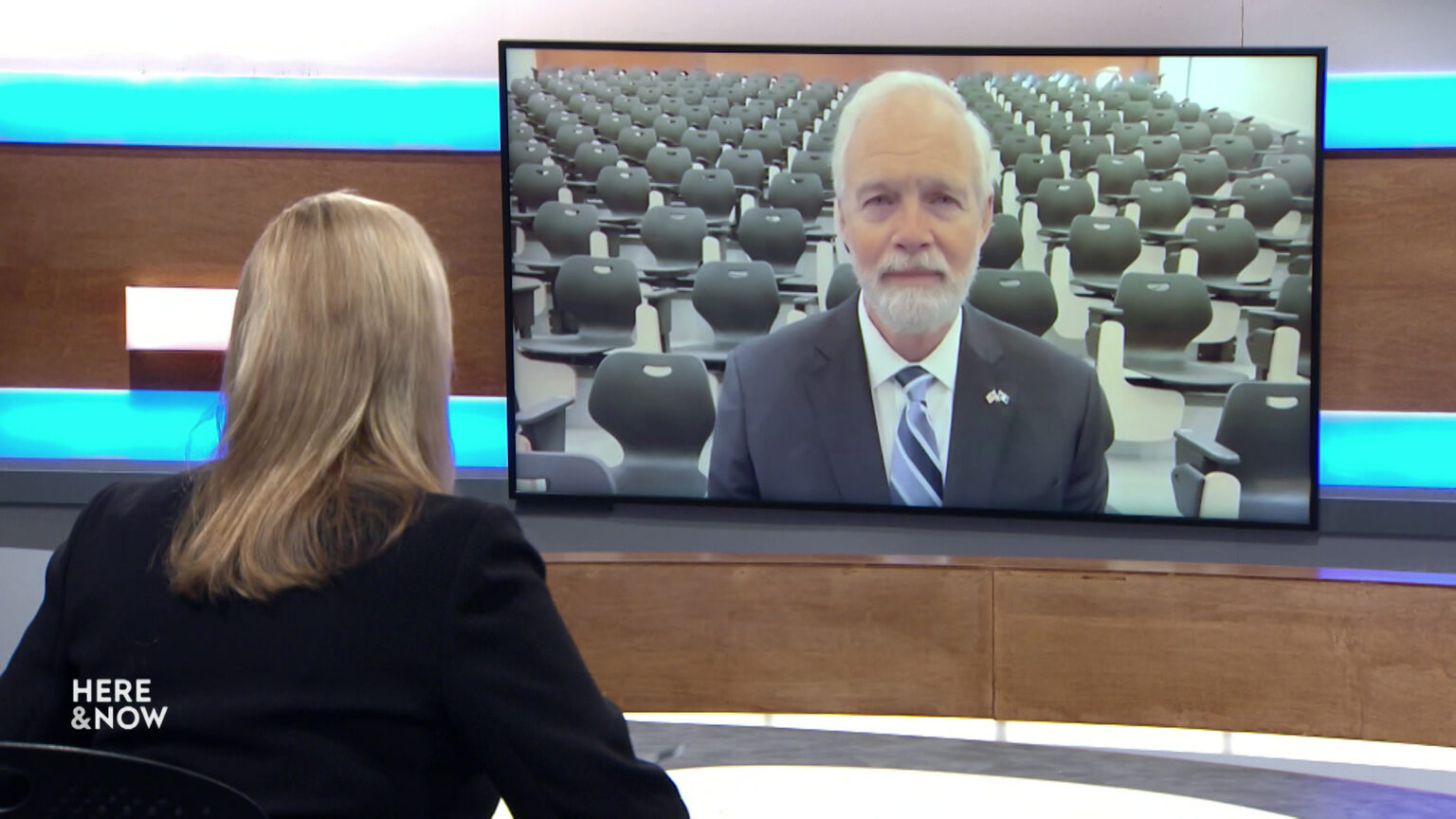'Here & Now' Highlights: US Sen. Ron Johnson, Charles Franklin, John Eich
Here's what guests on the February 9, 2024 episode said about border security and foreign aid, polling presidential primary candidates, and gaps in rural health care.
By Frederica Freyberg | Here & Now
February 12, 2024

Frederica Freyberg and U.S. Sen. Ron Johnson (Credit: PBS Wisconsin)
For months, Republicans in Congress conditioned the passage of emergency foreign aid on border legislation, but their members in the U.S. Senate blocked a compromise proposal — Wisconsin Republican U.S. Sen. Ron Johnson is among those leading the opposition. The t Marquette Law School Poll showed presidential candidates Joe Biden and Donald Trump tied among Wisconsin respondents, with poll director Charles Franklin discussing how neither enjoys high favorability rankings. As two hospitals and multiple health clinics in western Wisconsin prepare to close, John Eich from the Wisconsin Office of Rural Health described how the closures will hurt health care delivery.
U.S. Sen. Ron Johnson
(R) Wisconsin
- Johnson objected to U.S. Senate negotiations over a package of legislation that included targeted foreign aid alongside more funding for border security, and said it happened in secret. Mostly, the senator didn’t support the proposal for not shutting down the U.S. border with Mexico altogether — the package was blocked by Senate Republicans.
- Johnson: “I don’t believe they negotiated in good faith, but we weren’t looking for a massive, Rube Goldberg-like immigration bill. We were just looking for simple metrics. For example, tying Ukraine funding specifically to benchmarks that he would have to meet to have the money flow. And I think we were all shocked at what was produced.”
- The emergency aid funding for Ukraine, Israel and Taiwan is now a separate proposal. Johnson also voted against moving that forward, but its consideration did prevail.
- Johnson: “Our top priority should be to secure our own border before we spend money to secure Ukraine or any other nations. So we still want to make that point. But I’ve got real questions about the Ukraine war. The only way this thing ends is a negotiated settlement. Every day that goes by, I’m going to hate the settlement, but every day it goes by, more Ukrainians die. More Russian conscripts die — I take no joy in that, these are people yanked out of villages. More of Ukraine gets destroyed. So what our actions ought to be directed toward is bringing Putin to the negotiating table rather than fueling the flames of war, a bloody stalemate to the tune of over $60 billion.”
Charles Franklin
Director, Marquette University Law School Poll
- Polling released Feb. 7 that queried Wisconsin registered voters about 2024 presidential candidates showed President Joe Biden and former President Donald Trump in a dead heat at 49%. The survey also highlighted how respondents are dissatisfied with their choices – a measure of that is high unfavorability scores for both of them. One of the poll questions asked if either of the presumed nominees were too old to be president — for Trump 29% answered yes, while 61% said Biden was too old. (As of the polling, Trump is 77 years old while Biden is 81 years old.) That was before a U.S. Department of Justice special prosecutor chose not to charge Biden over his handling of classified documents, citing his age and saying the president has poor memory for things like not remembering important dates.
- Franklin: “Donald Trump is only four years younger, and yet far fewer people see him as too old. How does the campaign deal with this given this report and these explicit examples? And now, of course, everybody watching for every time Biden misspeaks.”
John Eich
Director, Wisconsin Office of Rural Health
- Western Wisconsin communities are working to fill the gap after two hospitals and 19 clinics announced they were closing with little notice. Eich said competition from Minneapolis/St. Paul hospitals likely factored in the decision to close. Meanwhile, he noted patients in Wisconsin needing emergency care could face dire consequences.
- Eich: “Health care is always life and death. And so I do think that it’s going to take longer for people to get to care. It’s going to be more challenging for them, for EMS, in particular in rural areas. We’re very concerned about drive times, … But I think that we have a robust health care system in the state, and people are doing their best and are providing excellent care.”
Watch new episodes of Here & Now at 7:30 p.m. on Fridays.
 Passport
Passport











Follow Us